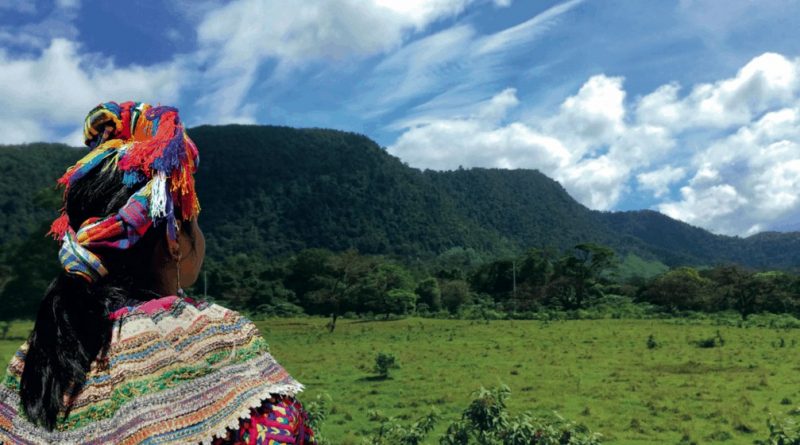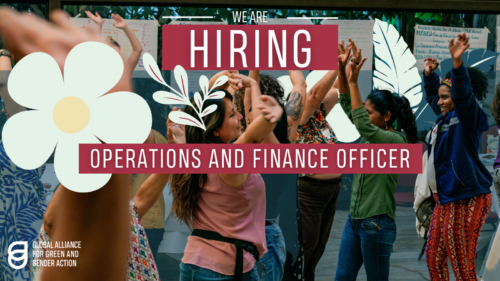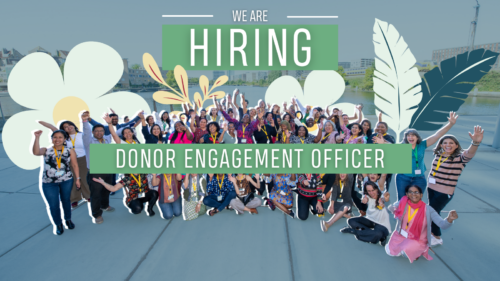Vice Versa: Indigenous women versus the megaproject

PUBLISHED IN VICE VERSA | JANUARY 9, 2020
By Jan-Albert Hootsen
In politically unstable Guatemala, indigenous communities are often the victims of environmental pollution and insecurity caused by large investment projects. In the Ixquisis region indigenous women, who suffer the consequences more severely than most, are fighting back. With the help of NGOs, they recently forced an investigation into the Inter-American Development Bank.
Liliana Ávila has to think for a moment when asked about her experiences in Guatemala in recent years. “It’s very difficult, a big challenge,” she says, “but also a positive experience. I’ve met inspiring women, and organizations that motivate me to carry on.”
Ávila is a lawyer located in Bogotá, who specializes in the rights of women in relation to the environment in Latin America. She works for the Interamerican Association for Environmental Defense (AIDA), an NGO that works to improve the living environment of local communities in Central and South America. She helps them with research and provides legal assistance.
In recent years, Ávila has been helping the people of the Ixquisis region of Guatemala in their fight against the construction of two dams partly financed by the Inter-American Development Bank (IDB). The dams are seriously threatening their living environment through environmental pollution and insecurity. She is focusing on the rights of women, as they are suffering the greatest harm.
“It is often difficult for women to participate in public life in Guatemala,” she explains. “They are expected to work at home or in the fields, but their voice is hardly heard.”
Fighting for the rights of women in a region where they are strongly marginalized is a relatively new phenomenon. But in a region like Ixquisis, women play a leading role in protecting the environment and fighting for the rights of their communities.
That is why the recent success of Ávila and AIDA is so special. At the beginning of 2019, MICI – an (on paper) independent body that deals with complaints about the internal policy of the IDB and, if necessary, investigates them – accepted a complaint submitted by AIDA and the women on the Ixquisis communities.
The complaint claims that the IDB authorized the construction of the dams too easily, violating the bank’s own internal rules on preventing environmental damage, the rights of women and indigenous communities, and adequate consultation and transparency. MICI consequently sent a team to Ixquisis to investigate the complaint.
“According to IDB policy, such megaprojects may not violate local communities’ rights, but the bank never monitors that sufficiently,” says Ávila sharply. “Besides the lack of local participation and consultation before the construction and the damage to their living environment actually started, the dams have also made the region a lot less safe.”
Green environment as a basic need for survival
Ixquisis lies a stone’s throw from the border between Guatemala and Mexico and some 150 kilometers to the north of Huehuetenango, the capital of the province with the same name. It is a mountainous and extremely fertile region with a sub-tropical climate, crisscrossed with rivers. For thousands of years, Ixquisis has been home to the Chuj, Q’anjob’al, Atiteko and Mam, the original ethnic Mayas in this part of Guatemala. They are agrarian communities with an exceptionally close bond with the land they live on; farming and fishing are the main economic activities.
“The water is everything to the local people,” says Ávila. “It is important as drinking water and for food. They use it to irrigate the land and for fishing, and to wash themselves and their clothes.”
There was thus considerable concern in the region when, in 2010, the company Promoción y Desarrollos Hídricos – now called Energía y Renovación – started building two large dams in the rivers Pojom and Negro. The projects – Pojom II and San Andrés – will eventually generate more than 20 megawatts of electricity and are co-financed by IDB Invest, a private branch of the IDB. In total, the IDB is investing some 13 million dollars (a little over 10 million euros) in the two dams.
The dams are being constructed against the will of the indigenous people of Ixquisis. In 2009, the local communities held a public consultation, in which the overwhelming majority of the population voted against the building of hydroelectric projects. The Maya communities fear what has happened with similar megaprojects in many other regions in Central America: severe economic damage for local people and destruction of their living environments.
Health and security
The fears about the megaprojects soon proved to be well-founded. According to an information leaflet drawn up by AIDA, the construction activities almost immediately led to a sharp decline in the quality of water in the local rivers. Many hazardous chemicals ended up in the water, including waste materials and oil used by the heavy equipment. And the exhaust fumes from the trucks and other machines polluted the natural environment in a large area around the dams.
That has not only caused health complaints among local people, who are still using the polluted rivers as their primary source of water. The economic damage is, if possible, even greater. The local people fish mainly for small species, including shrimps and snails, which are rapidly being depleted by the pollution. Polluted water also causes serious problems for irrigating fields and raising cattle.
In addition, security in the region has declined significantly since the construction started. “Women are being molested by people working on the projects,” says Ávila. “There have been violent incidents and people no longer feel safe on the street.”
The construction of Pojom II and San Andrés started without local communities being adequately informed. According to AIDA, they were also not offered the possibility of voicing their resistance to the projects in a public consultation. “The IDB never properly informed the communities about the possible consequences of the construction,” says Ávila. “The women were not involved at all.”
Women
Together with local partners, AIDA focuses especially on supporting the women in Ixquisis, because they are hit hardest by the construction of the dams.
“Although their role in public life is limited,” says Ávila, “the women are the heads of their households. They are in charge of the water, do the fishing and wash clothing. They are also harder hit by the increased insecurity – and if someone gets sick because of the polluted water, it is their job to take care of them.”
The complaint submitted by AIDA and its partners was accepted by the IDB at the end of January 2019. The bank sent an investigation team to Ixquisis to determine whether its internal policy on environment, consultation and the rights of women and indigenous communities was indeed being violated. It is a step in the right direction, but for Ávila it is only the beginning.
“It is of great importance that the women are now sufficiently involved in the process,” says Ávila. “They attach great importance to defending their rights. The IDB must review its internal rules and realize that there are other ways of producing energy.”
Strategic partnership
Situations like that in Ixquisis are unfortunately more the rule than the exception in regions in Central America. In the case of indigenous communities in Guatemala, the process of free, prior and informed consent applies, as laid down in the UN Declaration on the Rights of Indigenous Peoples.
Investors like the IDB rarely follow the process correctly when authorizing large-scale construction projects and hardly take responsibility for their negative consequences, says Tamara Mohr of Both Ends. Both Ends is a member of the strategic partnership Global Alliance for Green and Gender Action (GAGGA), which supports AIDA financially and with expertise.
“Local communities are almost never involved in how a project is implemented,” she explains. “We try to be involved at the earliest possible stage to ensure that the process goes as it should, but often the harm has already been done.”
Mohr is critical of the internal rules of investors like the IDB. “Even when matters like gender policy are clearly laid out on paper, implementation remains a great challenge. They think: there’s no one living in the area we’re going to build in, except maybe a few indigenous communities. In our experience, banks find it too complicated to talk to everyone to ensure they get satisfactory agreements, also because it slows the process down.”
That makes international cooperation essential, says Mohr. “It is important that the voices of these communities are heard, so that they don’t only feel like the victims of a situation that is beyond their control. In Guatemala they have little opportunity to enforce their rights – the only way to do that is internationally.”
The alliance
The campaign receives international support from GAGGA, a network of local groups, collectives, organizations, funds for women’s and environmental rights, and NGOs. The alliance’s aim is to make optimal use of knowledge, funds and other resources to support local organizations in their struggle. GAGGA is one of the Dutch Ministry of Foreign Affairs’ 25 strategic partners. It is led by the Fondo Centroamericano de Mujeres (FCAM) and works together with Both Ends and Mama Cash.
“We work mainly on women’s rights and environmental justice, based on the idea that women from various local groups take the lead,” says GAGGA coordinator Maite Smet. “They know what is happening and have proposals and a clear vision on how things can be different to the economic model based on exploitation and which exists in many places around the world, including Ixquisis.”
Through its network of organizations, GAGGA provides support through financing, technical and legal expertise and assisting local movements with appeals and legal processes.
Smet emphasizes, however, that support for partners goes further than this: “As a network we can bring groups, collectives and organizations from different movements and different work levels together. That is important.”
In this way, through GAGGA, AIDA made contact with FCAM, a regional women’s fund that provides financial support and supervision to local women’s groups and collectives fighting for women’s rights in Central America. That relationship has further strengthened AIDA’s work, which focuses mainly on justice in the context of the living environment.
“There is still a lot of ‘machismo,’ male chauvinism, in Central America and it is important for women to acquire their own space, where they can think together in confidence about how megaprojects and the exploitation of natural resources impact on their communities and lives,” says Maria Estelí of FCAM.
“Especially in Ixquisis, many women speak little or no Spanish, only local Maya dialects,” she continues. “And there is hardly any research into the specific consequences of these megaprojects in Ixquisis and other regions where they are being implemented.
The voices and demands of the indigenous women who suffer the consequences of the projects must be included in the complaints and the investigation carried out by the team. Strategies and mechanisms need to be designed to make this possible.”
Strengthening policy
Although the acceptance of the complaint submitted by the communities in Ixquisis is a step in the right direction, according to Liliana Ávila, the fight is by no means over. She says that it is now important that the IDB’s investigation is carried out in the correct manner and that the women in the region are sufficiently involved.
“The IDB has appointed a number of experts and we have determined that none of them have expertise in the field of gender,” says Ávila. “They have not yet published their final report. I think that their policy on impact on women is not very strong, but we are waiting until the report comes out. I hope that it will lead to financial institutions like the IDB strengthening their policies, so that they will allow women a voice in the future.”
Tamara Mohr of Both Ends is pleased that the investigation has taken place, but warns that it is important to be aware that a complaint almost never stops a project: “It can only result in compensation for the victims, but is rarely a solution for the problems that people face on a day-to-day basis as the consequence of a large-scale project. We have to prevent those consequences rather than conduct investigations that come too late to have any real effect.”
Maria Estelí of FCAM is, however, optimistic about the effect that the work in Ixquisis can have in the region. “We have learned a lot in recent years working on this case,” she says. “I think we can apply those lessons elsewhere in Latin America where local communities are resisting and fighting against large projects that are impacting their living environments. One positive experience is how different organizations working on women’s and environmental rights are cooperating, learning and strengthening the impact of their strategies.”
Giammattei
In the case of Guatemala, that international cooperation is of great importance because the political climate for women’s and environmental organizations is not improving. On 14 January, arch-conservative Alejandro Giammattei was sworn in as the new president. He is a former prison director with close ties to the army and the conservative business elite in the country. He is certainly not known as someone with a strong interest in human rights, the environment or women’s emancipation.
“The political climate can become quite a lot more difficult,” confirms Ávila. “But Guatemala is also a country with a strong tradition of resistance. It has had civil wars and extreme conservative governments, but the original communities are still there and continue to strengthen themselves. That is wonderful to see; it is one of the things that inspires me enormously in my work.”
The Global Alliance for Green and Gender Action (GAGGA) is a strategic partnership between the Fondo Centroamericano de Mujeres (FCAM), Mama Cash, Both Ends and the Dutch Ministry of Foreign Affairs. The ministry is providing funding worth 32 million euros for the 2016-2020 period. The alliance’s motto is: “Strengthen and unite the agendas for women’s rights and environmental justice – the moment is now!”

We Are Hiring: Operations and Finance Officer!
DEADLINE EXTENDED! Are you passionate about ensuring efficient financial management and operational excellence to support transformative work in climate, environmental,…

We Are Hiring: Donor Engagement Officer!
DEADLINE EXTENDED! Are you passionate about cultivating relationships and securing funding to support transformative work in climate, environmental, and gender…

Welcoming Anamika Dutt As GAGGA’s Planning, Monitoring, Evaluation & Learning (PMEL) Officer!
Anamika Dutt is a feminist MEL practitioner from India. Anamika believes that stories of change and impact are best heard…
Subscribe to our newsletter
Sign up and keep up to date with our network's collective fight for a gender and environmentally just world.
